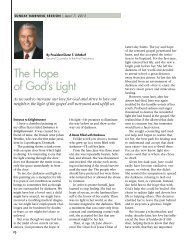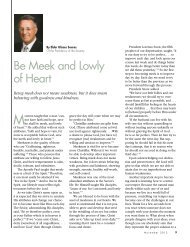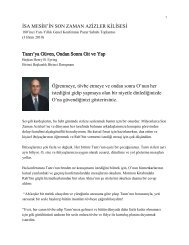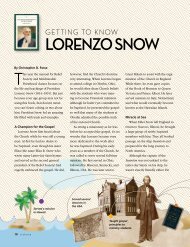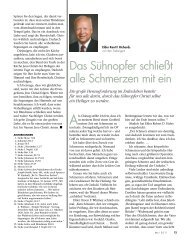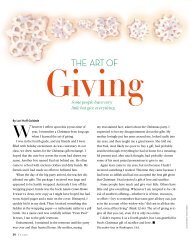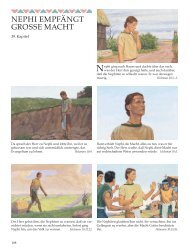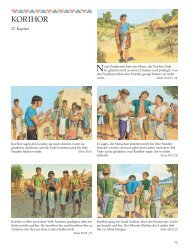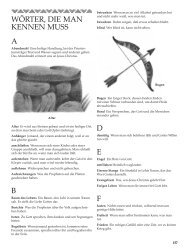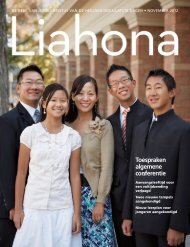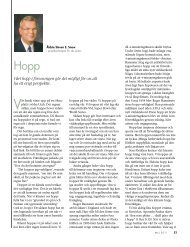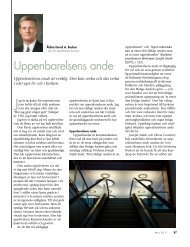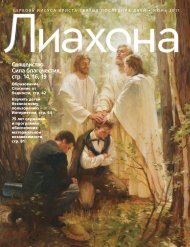April 2012 Ensign - The Church of Jesus Christ of Latter-day Saints
April 2012 Ensign - The Church of Jesus Christ of Latter-day Saints
April 2012 Ensign - The Church of Jesus Christ of Latter-day Saints
You also want an ePaper? Increase the reach of your titles
YUMPU automatically turns print PDFs into web optimized ePapers that Google loves.
One <strong>of</strong> the reasons<br />
the scriptures<br />
are so full<br />
<strong>of</strong> examples and<br />
teachings <strong>of</strong><br />
God’s majestic<br />
power is to show<br />
us that nothing<br />
is too hard for<br />
the Lord.<br />
52 <strong>Ensign</strong><br />
<strong>The</strong> LDS Bible Dictionary defines grace as<br />
the “enabling power” 1 <strong>of</strong> <strong>Christ</strong>. Elder David A.<br />
Bednar <strong>of</strong> the Quorum <strong>of</strong> the Twelve Apostles<br />
has taught, “<strong>The</strong> enabling power <strong>of</strong> the<br />
Atonement <strong>of</strong> <strong>Christ</strong> strengthens us to do<br />
things we could never do on our own.” 2<br />
Our Father in Heaven wants us to recognize<br />
that, spiritually speaking, we are like<br />
children born without arms—totally dependent<br />
upon the loving and caring arms <strong>of</strong><br />
another—<strong>Jesus</strong> <strong>Christ</strong>. <strong>The</strong> Book <strong>of</strong> Mormon<br />
prophet Jacob taught, “<strong>The</strong> Lord God<br />
showeth us our weakness that we may know<br />
that it is by his grace, and his great condescensions<br />
unto the children <strong>of</strong> men, that we<br />
have power to do these things” ( Jacob 4:7).<br />
One <strong>of</strong> my favorite scriptural accounts that<br />
illustrates this important principle is found in<br />
Matthew chapter 14. As the disciples watched<br />
the Savior walk on the Sea <strong>of</strong> Galilee toward<br />
their boat, they thought they were seeing a<br />
ghost. <strong>Jesus</strong> assured them that it was He and<br />
that they need not be afraid. Peter declared,<br />
“Lord, if it be thou, bid me come unto thee<br />
on the water” (verse 28). <strong>Jesus</strong> said, “Come.”<br />
Matthew then records, “And when Peter<br />
was come down out <strong>of</strong> the ship, he walked<br />
on the water, to go to <strong>Jesus</strong>” (see Matthew<br />
14:24–29).<br />
<strong>The</strong> rest <strong>of</strong> the story is what I find most significant.<br />
I can’t relate to walking on water, but<br />
I can relate to what Peter experienced next:<br />
“But when he saw the wind boisterous, he<br />
was afraid; and beginning to sink, he cried,<br />
saying, Lord, save me.<br />
“And immediately <strong>Jesus</strong> stretched forth his<br />
hand, and caught him, and said unto him,<br />
O thou <strong>of</strong> little faith, wherefore didst thou<br />
doubt?<br />
“And when they were come into the ship,<br />
the wind ceased.<br />
“<strong>The</strong>n they that were in the ship came and<br />
worshipped him, saying, Of a truth thou art<br />
the Son <strong>of</strong> God” (Matthew 14:30–33).<br />
All <strong>of</strong> us have had, are having, or will yet<br />
have a Peter-like “sinking” experience in<br />
some way and will at some time (probably<br />
many times) cry out, “Lord, save me.” Even<br />
Peter’s strong fisherman arms were not strong<br />
enough to save him. He needed the rescuing<br />
arms <strong>of</strong> <strong>Christ</strong>, and so do we. Can you<br />
imagine Peter—choking, his head bobbing<br />
beneath the surface <strong>of</strong> the water—saying as<br />
the Savior extends His arms: “No, thank you.<br />
I will swim to shore. I sank myself, so I must<br />
save myself”? Of course not. How ridiculous!<br />
Yet we sometimes do just that.<br />
We may know in our heads that our mortal<br />
arms and hands are deficient—in fact,<br />
utterly incapable <strong>of</strong> rescuing or redeeming<br />
us—but we sometimes resist, even recoil<br />
from, the outstretched arms <strong>of</strong> the Savior.<br />
Sometimes we spiritually drown ourselves<br />
because we won’t allow His arms to cradle<br />
us. Elder Jeffrey R. Holland <strong>of</strong> the Quorum <strong>of</strong><br />
the Twelve eloquently stated:<br />
“May I be bold enough to suggest that it is<br />
impossible for anyone who really knows God<br />
to doubt his willingness to receive us with<br />
open arms in a divine embrace if we will but<br />
‘come unto Him.’ . . .<br />
“I am convinced that none <strong>of</strong> us can<br />
appreciate how deeply it wounds the loving<br />
heart <strong>of</strong> the Savior <strong>of</strong> the world when he<br />
finds that his people do not feel confident in<br />
his care or secure in his hands.” 3<br />
RANE<br />
WALTER BY WATER, ON WALKED SAVIOR THE RIGHT: RANE; WALTER BY<br />
<strong>The</strong> scriptures contain many references to<br />
SON, MY<br />
the arms <strong>of</strong> the Lord. <strong>The</strong>y describe different<br />
THEE<br />
ways whereby His arms bless our lives and<br />
UNTO<br />
strengthen our arms. I wish to focus on three:<br />
His arms <strong>of</strong> power, His arms <strong>of</strong> love, and His<br />
BROUGHT I<br />
arms <strong>of</strong> mercy. <strong>The</strong>se three, though certainly<br />
HAVE<br />
related to each other, are unique in what they<br />
MASTER,<br />
do for us and to us. LEFT:



